This is pretty fascinating, if not also very chilling (h/t Stacy Trasancos).
Stacy highlighted a key exchange between Roe attorney Sarah Weddington and a few of the Justices (beginning at 20:37 in the second audio file):
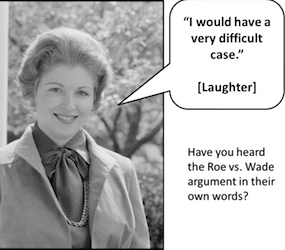 Justice Harry A. Blackmun: But tell me why you didn’t discuss the Hippocratic Oath.
Justice Harry A. Blackmun: But tell me why you didn’t discuss the Hippocratic Oath.
Mrs. Weddington: Okay.
I guess it was– okay, in part, because the Hippocratic Oath, we discuss basically the constitutional protection we felt the woman to have.
The Hippocratic Oath does not pertain to that.
Second, we discuss the fact that the state had not established a compelling state interest.
The Hippocratic Oath would not really pertain to that.
And then, we discuss the vagueness jurisdiction.
It seem to us that that, that the fact that the medical profession, at one time, had adopted the Hippocratic Oath does not weight upon the fundamental constitutional rights involved.
It is a guide for physicians, but the outstanding organizations of the medical profession have, in fact, adopted a position that says the doctor and the patient should be able to make the decision for themselves in this kind of situation.
Justice Harry A. Blackmun: Of course, it’s the only definitive statement of ethics in the medical profession.
I take it, from what you just said, that you’re—you didn’t even footnote it because it’s old.
That’s about really what you’re saying.
Mrs. Weddington: Well, I guess you…it is old, and not that it’s out of date, but it seemed to us that it was not pertinent to the argument we were making.
Justice Harry A. Blackmun: Let me ask another question.
Last June 29, this Court decided the capital punishment cases.
Mrs. Weddington: Yes, sir.
Justice Harry A. Blackmun: Do you feel that there is any inconsistency in the Court’s decision in those cases outlying the death penalty with respect to convicted murderers and rapists at one end of lifespan, and your position in this case at the other end of lifespan?
Mrs. Weddington: I think had there been established that the fetus was a person under the Fourteenth Amendment or under constitutional protection then there might be a differentiation.
In this case, there has never been established that the fetus is a person or that it’s entitled to the Fourteenth Amendment rights or the protection of the constitution.
It would be inconsistent to decide that, after birth, various classifications of persons would be subject to the death penalty or not but, here, we have a person, the woman, entitled to fundamental constitutional rights as opposed to the fetus prior to birth where there is no establishment of any kind of federal constitutional rights.
Justice Harry A. Blackmun: Well, do I get from this then that your case depends primarily on the proposition that the fetus has no constitutional rights?
Mrs. Weddington: It depends on saying that the woman has a fundament constitutional right and that the state has not proved any compelling interest for regulation in the area.
Even if the Court, at some point, determined the fetus to be entitled to constitutional protection, you would still get back into the weighing of one life against another.
Justice Byron R. White: And that’s what’s involved in this case, weighing one life against another?
Mrs. Weddington: No, Your Honor.
I said that would be what would be involved if the facts were different and the state could prove that there was a person for the constitutional right.
 Justice Potter Stewart: Well, if it were established that an unborn fetus is a person within the protection of the Fourteenth Amendment, you would have almost an impossible case here, would you not?
Justice Potter Stewart: Well, if it were established that an unborn fetus is a person within the protection of the Fourteenth Amendment, you would have almost an impossible case here, would you not?
Mrs. Weddington: I would have a very difficult case. [Laughter]
Justice Potter Stewart: You certainly would because you’d have the same kind of thing you’d have to say that this would be the equivalent to after the child was born.
Mrs. Weddington: That’s right.
Justice Potter Stewart: If the mother thought that it bothered her health having the child around, she could have it killed.
Isn’t that correct?
Mrs. Weddington: That’s correct.
Chief Justice Warren E. Burger: Could Texas constitutionally…did you want to respond further to Justice Stewart?
Did you want to respond further to him?
Mrs. Weddington: No, Your Honor.
 Lizzie Velásquez is a 24 year old American woman who was born with a very rare disease (shared by only one other person in the United States) that doesn’t allow her to gain weight. She has been bullied most of her life, including being labeled the “World’s Ugliest Woman” in an internet video that received over a million views and thousands of vile comments.
Lizzie Velásquez is a 24 year old American woman who was born with a very rare disease (shared by only one other person in the United States) that doesn’t allow her to gain weight. She has been bullied most of her life, including being labeled the “World’s Ugliest Woman” in an internet video that received over a million views and thousands of vile comments. 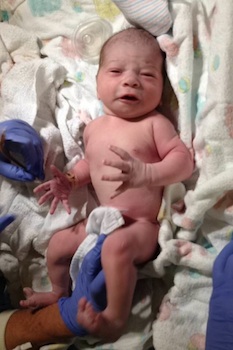
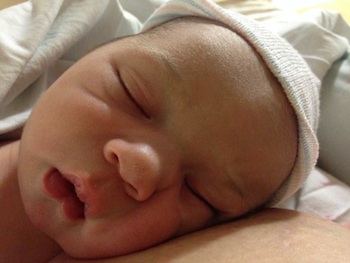
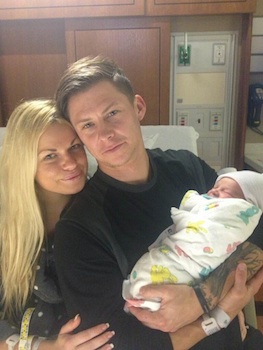
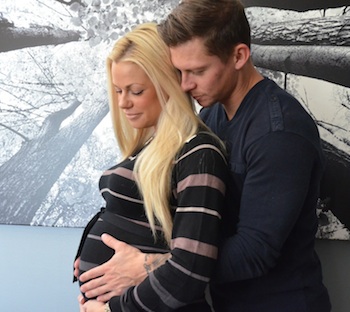
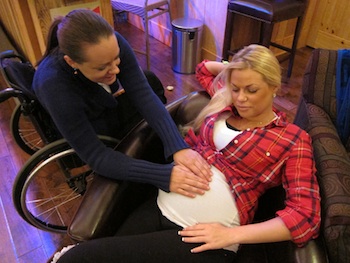

 From the video description:
From the video description:  Over at Catholic Exchange,
Over at Catholic Exchange, 

